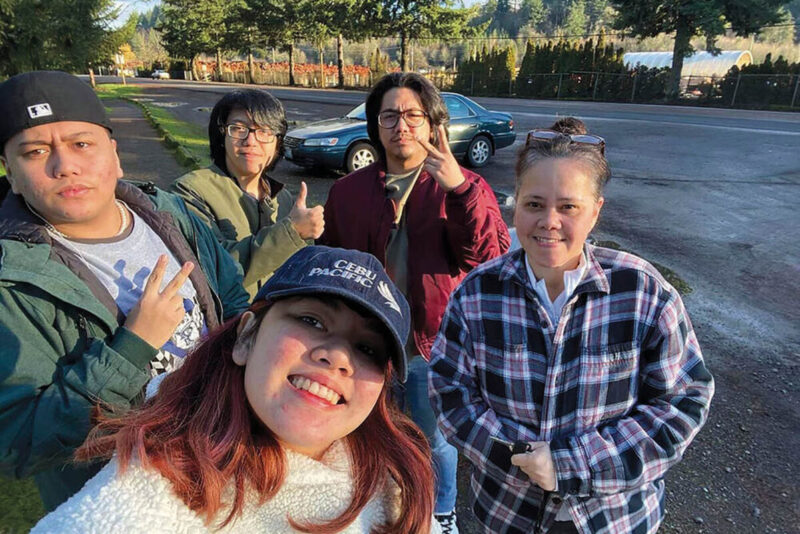Benny Westcott
On the early afternoon of Dec. 5, two young Filipinos, 22-year-old Veronica Howser and 19-year-old Jacob Howser, sat on a plane that landed at Portland International Airport.
After disembarking and walking into the airport, taking their first steps on American soil, they were greeted with hugs and exultations from brothers Luke Piatos and Ron Gabriel Howser and mother Gidget Howser, all Sweet Home residents.
For the last 18 years, the latter had worked hard to make their arrival happen.
In December 2003, Gidget moved to Sweet Home from Manila, the coastal capital of the island-chain nation of the Philippines.
She wanted to be closer to her father, Henry Howser, whom she had never met. Howser, an American citizen, had married Gidget’s mother in the Phillipines. He returned to California when his wife was seven months pregant with Gidget. Later, he would move to Sweet Home.
Twenty-seven-year-old Gidget was pregnant with Luke and her other children were young when she also moved to Sweet Home. Ron Gabriel was 5, Veronica was 3 and Jacob was only 1. Luke came with her to Oregon. The other three stayed behind in Manila, where they were raised by their father, Ronald Piatos, and grandmother Naty Piatos, Gidget’s mother-in-law.
For nearly 18 years, Gidget has worked as a food clerk at Safeway. Three years ago she started also working as a server at The Point in order to save some money. Apart from two visits to the Philippines in 2011 and 2017, Gidget and Luke’s only contact with the family has been through Skype and other such virtual applications.
“It’s hard, especially if you are a mom and you’re far away from your kids,” Gidget said. “Sometimes you don’t sleep. Other times you wake up and suddenly realize your kids aren’t there. Sometimes I would cry at night. It’s tough when they are sick and you can’t do anything, and when you’re not there for graduations, birthdays, Christmases.”
Although she obtained American citizenship herself after arriving stateside, she was unable to transfer it to her three oldest children. She attempted to secure them a tourist visa to visit the U.S., but her request was denied. She also petitioned for green card residence visas for her three children, which they eventually used to move to the country, but not without considerable hassle.
In the Philippines, birth certificates and school-related paperwork had to be amassed. “Barangay Clearances” (certificates of residency) needed to be secured, as did MBI clearances checking for criminal records. Physical and medical examinations had to be conducted at a U.S. consul two hours from where the family lived, costing $600 per child.
The bill increased from charges Gidget incurred in the U.S. while attempting to bring her children to the country. Attorney fees were $2,000 per person. Visas were $280 a pop, and other miscellaneous paperwork added up to $820 more in costs per child. There were also flights to consider.
Friends helped Gidget as she worked and saved. Upon hearing of the family’s mission in 2018, Gidget’s friend Katie Black organized a GoFundMe for Ron Gabriel’s immigration paperwork, yielding $1,800 in donations.
“The GoFundMe, that’s why he came here, that’s why we were able to manage that one,” Gidget said.
The Point’s owner, Michael Hall, also lent a hand by paying for Ron Gabriel’s plane ticket.
After her eldest son’s arrival, Gidget readied paperwork to bring her two remaining children to the U.S. The process seemed to be moving smoothly until the coronavirus pandemic delayed it. Finally, on Dec. 5, mother and children were finally reunited, fully this time.
While transitioning to any new country surely comes with growing pains, Gidget said her children will find it easier than she did, primarily because they all speak English while she did not upon arriving in America. Acclimating to chilly weather after a life spent in the Philippines’ balmy temperatures, however, might prove more challenging.
“My oldest son is catching on to it really well by now,” Gidget said. “He’s wearing short sleeves,” His siblings, unfortunately, are starting to say, “It’s cold here.”
Despite the weather change, Gidget keeps the family’s Filipino culture intact in their new home, especially at mealtime. She often makes adobo sinegan (egg roll), adobo (a sweet and sour pork or chicken dish), and sinigang (chicken, pork or beef with a tamarind sour soup base).
She also tries to teach her children morals she picked up from her Filipino heritage. Among these is the credo “Honesty is the best policy” and a penchant for respecting elders. She still uses a Filipino phrase, “po opo,” when responding to an elder. These words assert an understanding to an elder as a sign of respect.
Gidget enjoys living in Sweet Home, she said. She likes Foster Lake, which she says reminds her of her grandpa’s hometown Buhi, which she would visit while growing up. But she does miss some things about her homeland.
“Here, it’s ‘Got to get up early in the morning, go to work, go to this and that,'” she said. “There’s no space to take a breath. Over there (in the Philippines), you can hang out with friends. Since I got here, I never hang out. It’s work, work, work.”
She’s made friends in the U.S., of course, and has even met people with Filipino backgrounds, but she said that the virus has put a temporary hold on social gatherings. She also misses “piesta,” a weekly gathering where people would enjoy each other’s company and eat.
While the family may still yearn for the Philippines from time to time, the next generation looks forward to living and achieving in America.
Ron Gabriel wants to be a chemical engineer, and is currently in his last semester at Eulogio “Amang” Rodriguez Institute of Science and Technology in Manila, taking courses online. Veronica hopes to attend nursing school. Jacob is considering college to become a realtor, and Luke’s set his sights on finishing his high-school career strong in his last semester at Sweet Home High School.
For now, the family is just enjoying their time spent living all under the same roof again.
After the two recent arrivals, Luke said, “It’s not too different from when Gab came around,” referencing his oldest brother. “The house doesn’t feel that full. Mom was worrying it would be cramped, but I haven’t really noticed.”





